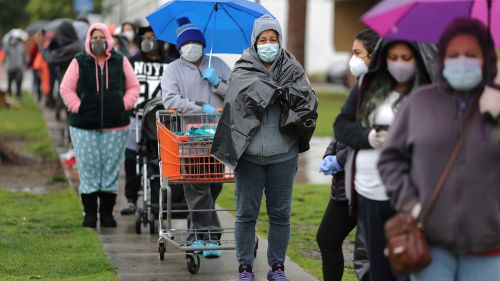As COVID Cases Rise So Does Public Concern about the Economic Impact

An update on global public opinion on the COVID-19 pandemic reviews survey results from countries in North America, Europe, and Asia.
Global Public Opinion and the Coronavirus Weekly Update
As the worldwide toll of the coronavirus’s impact mounts, with nearly 1.5 million infected globally and more than 83,000 deaths, public opinion in many countries is also concerned about the economic impacts and is expecting even worse effects ahead. The Chicago Council Survey team updates on global public opinion includes polling results from the United States, Japan, South Korea, Canada, the United Kingdom, Italy, and France. We will continue to provide weekly updates on public opinion around the world on the COVID-19 pandemic.
Key Findings
- Despite widespread concerns about the economic impact of the coronavirus pandemic in the United States, most Americans prioritize containing the disease over reopening the economy.
- While Canadians remain highly concerned about the disease and fear the worst is ahead, the government receives high marks for clearly communicating crucial information.
- Even as Boris Johnson fights a severe case of COVID-19 in the hospital, Britons are increasingly confident in the ability of the National Health Service to fight the coronavirus outbreak.
- Japanese Prime Minister Abe’s decision to declare a state of emergency, while much-debated beforehand, looks to be a popular move for the public as confirmed COVID-19 cases in the country climb.
North America
United States
More than twelve thousand Americans have now died from COVID-19, and nearly 400,000 cases have been reported nationwide. As the disease continues to spread, ABC News/Ipsos polling finds that the outbreak has affected nearly all Americans, with 91 percent saying their regular daily routine has changed as a result of the coronavirus outbreak. A Kaiser Family Foundation survey conducted March 25-30 finds 72 percent of Americans saying their lives have been disrupted (either “a lot” or “some”) by the outbreak. While earlier polls found partisan divisions on whether or not the coronavirus outbreak had disrupted Americans’ lives, the latest survey finds that the gap between Democrats and Republicans has narrowed considerably, declining from 19 points to just six.
The spread of the coronavirus has also raised public concerns over contracting it. Half of Americans (50%) now say they are very concerned that they or someone they know will be infected with the coronavirus, up from one in four (26%) in a March 11-12 poll. In response, most Americans (92%) say they are socially distancing, and eight in ten (82%) report sheltering in place, meaning they have not left home except for essential services. Those changes in behavior are aided by the growing spread of shelter-in-place orders, issued at both the state and city levels.
With weekly unemployment claim filings setting record highs, Americans’ economic concerns are also on the rise. Nearly four in ten (39%) reporting that they have either lost their job, lost income, or had hours reduced without pay because of the outbreak. Large majorities of Americans say they are worried that local businesses will close permanently because of the loss of revenue (85%) and that the US economy will head into recession (79%). These economic concerns often mix with concern about contracting the coronavirus while working: a majority (57%) say they are worried they will put themselves at risk of exposure because they cannot afford to miss work.
When asked what the country should prioritize—slowing the spread of the disease or reopening the economy—80 percent of Americans choose to prioritize slowing the spread. Half (51%) are very worried that the country’s health care system will be overrun, preventing people from getting needed medical care. Americans are not looking at the future with rose-tinted glasses: three-quarters of Americans (74%) say the worst is yet to come, up from 60 percent who said the same in an NBC News/Wall Street Journal poll March 11-13.
Canada
Though the number of COVID-19 cases in Canada continues to rise, breaking the 17,000 mark this week, Canadians’ evaluations of the federal government’s response in handling the COVID-19 outbreak continue to rise as well. According to Angus Reid Institute polling conducted April 1-3, seven in ten (70%) say the government has done a good job, up from 49 percent in early March. The government’s communications strategy has contributed to these approval ratings: most Canadians also say that government officials are providing enough information to understand the situation (70%) and say public health officials have been clear in their communications. A majority (52%) say information and advice have been totally clear, and an additional 39 percent say it has been “pretty clear.”
The public also remains concerned about the risk of contracting the coronavirus, with nearly three-quarters (73%) saying they are concerned about personally contracting the coronavirus. There is also a large and growing age gap when it comes to personal concerns: Canadians over the age of 55 are far more likely to report being very concerned about catching the disease (34%, compared to 16% of Canadians age 35 and under).
Beyond the danger of catching coronavirus is the impact of the pandemic on the Canadian economy. Most Canadians (61%) say they are in good financial shape at the moment. More than a quarter (27%) say they are in bad shape (22%) or terrible shape (5%). Much of the immediate impact on the Canadian labor market appears to have already hit, with few shifts since the previous poll conducted March 20-23. But the impact is nonetheless severe, with 45 percent reporting that their household has seen lost work or suffered a layoff. And while young Canadians are less concerned about catching the disease, they are more likely to have been affected economically: 72 percent of Canadians under 25, and another 49 percent of those aged 25-34, have been laid off as a result of the pandemic.
Is there hope on the horizon? Not according to most Canadians: nearly nine in ten (87%) that that they expect the economic situation in Canada to get worse still.
Europe
Italy
Italian attitudes about the threat from coronavirus have largely stabilized, but fear of impending economic strife is beginning to set in. Overall, according to a McKinsey poll from March 26 to 29, as many Italians are concerned about the Italian economy (80%) as they are about overall public health (79%). Many businesses are urging the Italian government to loosen the lockdown restrictions with the aim of restarting the economy and allowing vulnerable populations to get back to work.
Polling from Ipsos between March 31 and April 2 shows that Italians predict that primarily self-employed workers (42%) and the dependents of small businesses (22%) will absorb the largest negative economic impact of this emergency. While a majority are still primarily concerned about the infection to themselves or their family (70%), a growing proportion are worried about the loss of income and work (22%, up from 16% the week before).
The Italian government has approved a 600-euro payment to self-employed and seasonal workers, but many unemployed Italians are not eligible for this stimulus. Despite widespread economic hardships, Italians believe that economic aid should go primarily to families to sustain their consumption (56%) as opposed to businesses to avoid layoffs (29%).
France
Christophe Castaner, the minister of the interior, has praised the French people for being “part of those who best respect the lockdown,” as the rate of new infections in France drops. While the death toll continues to rise, the French people are showing signs of hope for a swift conclusion to this crisis.
Polling from BVA conducted between April 3 and 5 shows that the French people’s sentiments are stabilizing–and in some cases, improving–following a rapid drop as the situation worsened in March. On the subject of the government’s handling of the crisis, the public has stayed steady at 37 percent confident since March 24th, though just five days prior on the 19th, 55 percent had said they were confident in the way the government was dealing with the outbreak.
Asked about the financial situation of their home, 57 percent say they are very or somewhat confident, up from 49 percent over a week ago. Despite this, the French have a much more dismal view of the general economy; only 14 percent responded that they were either very or somewhat confident in the economic situation of France.
United Kingdom
While Boris Johnson is in the intensive care unit due to severe COVID-19 symptoms, foreign secretary Dominic Raab has taken Johnson’s role directing national affairs. Should Johnson be unable to fulfill his duties as Prime Minister, Raab is next in line.
Despite this potential shake up of British leadership, Britons are supportive of the government’s increasingly restrictive actions and feel that they have been clearly informed of how to protect themselves from the virus. An Ipsos MORI poll from March 27 to 30 found that 73 percent of Britons say they have received a great deal of information about how to protect themselves and 90 percent saying the instructions are very or fairly clear. Consequently, 79 percent of respondents say they have changed their behavior to avoid leaving the house.
Beyond clear and thorough communication about safety measures, Brits have become gradually more confident in the National Health Service (NHS) to deal with those infected with COVID-19. Seventy-one percent are either very or fairly confident in the NHS’ ability to deal with the ill, up from around 60 percent in mid-March.
Nonetheless, even with the stricter limitations on being in public and confidence in the NHS, Britons are still increasingly concerned about the risk that the coronavirus poses to themselves (78% very or fairly concerned) and to the country as a whole (94% very or fairly concerned).
Asia
Japan
After avoiding a major outbreak for months, major cities in Japan including Tokyo and Osaka are now under emergency declarations issued by Prime Minister Abe. Tokyo Governor Koike has urged residents of the city to isolate themselves for the next month. The declaration of a state of emergency is likely to meet with public support: according to a TBS/JNN poll conducted April 4-5, eight in ten Japanese (80%) say that a state of emergency should be declared.
However, the same poll finds that a majority (55%) disapprove of the government’s reaction to the coronavirus outbreak thus far, up five points over the past month, while support for the government’s reaction has declined six points to 31 percent.
The emergency declaration will disrupt the planned reopening of schools in Japan following their abrupt closure last month. With rising concerns about the spread of the coronavirus, seven in ten Japanese (70%) say that in order to prevent the spread of the coronavirus, the school closures should continue—even though the closure has caused problems for many parents.
The coronavirus outbreak is also a shock to the economic system, one now being compared to the September 2008 “Lehman Shock” which set off the 2008 financial crisis and recession. To deal with the economic damage, Prime Minister Abe announced Monday a massive economic stimulus package. While details are not yet available, the scale of the effort—¥108 trillion, or 20 percent of Japan’s GDP—far exceeds the efforts adopted after the Lehman Shock. It also features at least ¥6 trillion in cash payouts to households and small to midsize firms.
That infusion of cash is the most-desired economic response among the public. In TBS/JNN polling prior to the announcement, four in ten Japanese (43%) say that they hope the government will respond with cash payments, while one-third (33%) hope for a cut in the consumption tax rate.
Less popular was Abe’s announcement of a plan to provide two cloth masks to each household in Japan. Dubbed “Abenomask” on the internet, the plan was widely mocked as insufficient to meet the challenge. That unpopularity is reflected in the TBS/JNN data: three-quarters of Japanese (75%) disapprove of the proposal.
South Korea
South Korea continued to flatten its COVID-19 curve, registering just 47 new cases on April 5, and on April 7 the number of cases stood at 10,331. The test, trace, and treat program has been a resounding success, in part because of a supportive public that significantly altered its actions.
In the latest Gallup Korea polling, 96 percent say they lessened or refrained from attending meetings or gatherings. Nine in ten (91%) report refraining from hospital or clinic visits and the same number say the same about going to the market or department stores. Eighty-seven percent also say they refrained from taking public transport. Clearly, daily activities have been altered in a major way, but it is worth noting that the South Korean government’s preparation and execution helped avoid city-wide shutdowns.
Headed into the world’s first major election during the pandemic, President Moon and his party are in stronger positions ahead of the April 15 National Assembly elections than when the outbreaks began. Approval rates for the president are now at 56 percent and support for his party is now at 41 percent, the highest rating since early December 2019.





